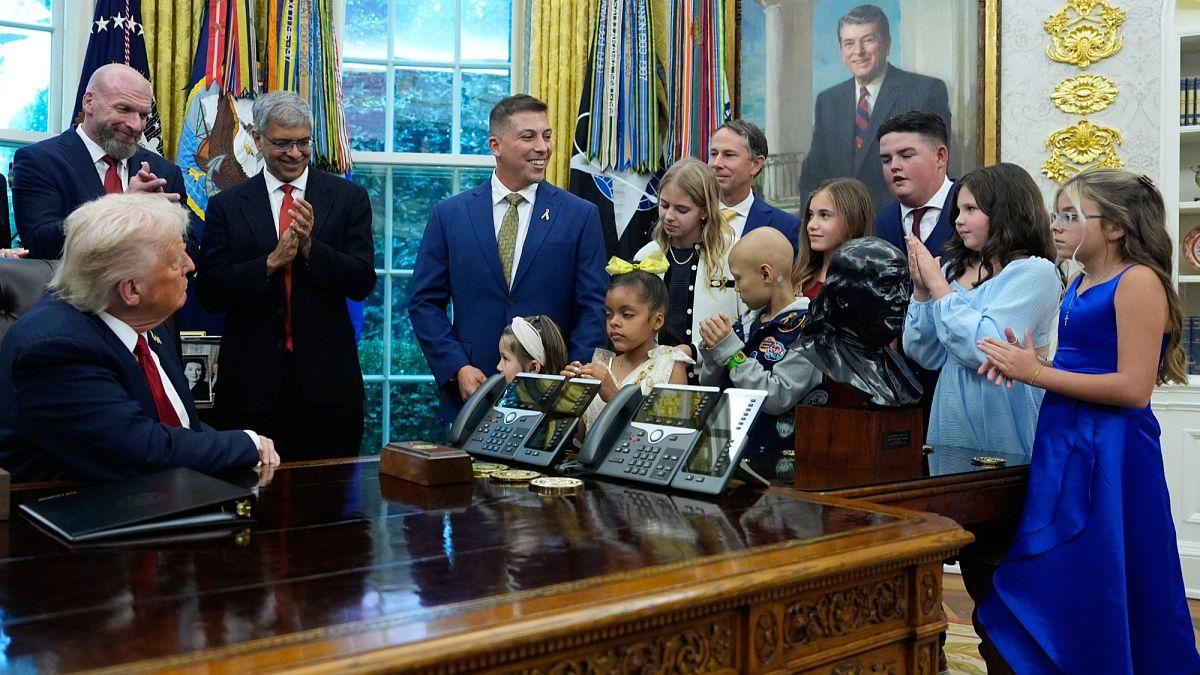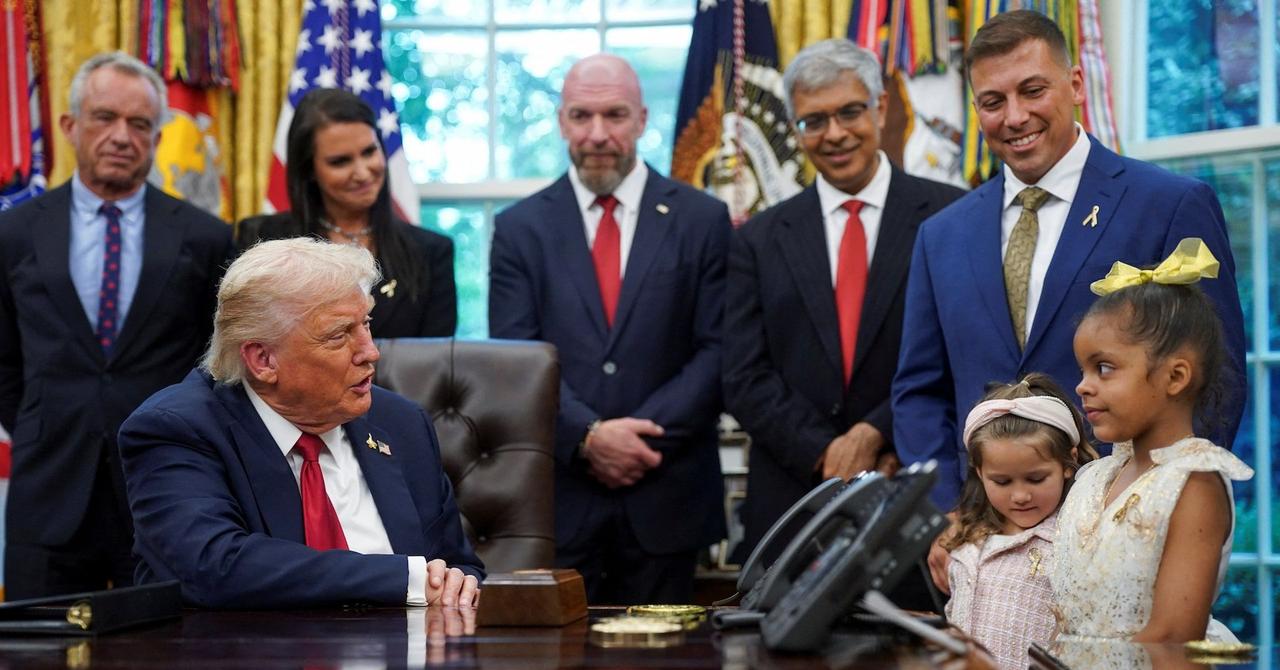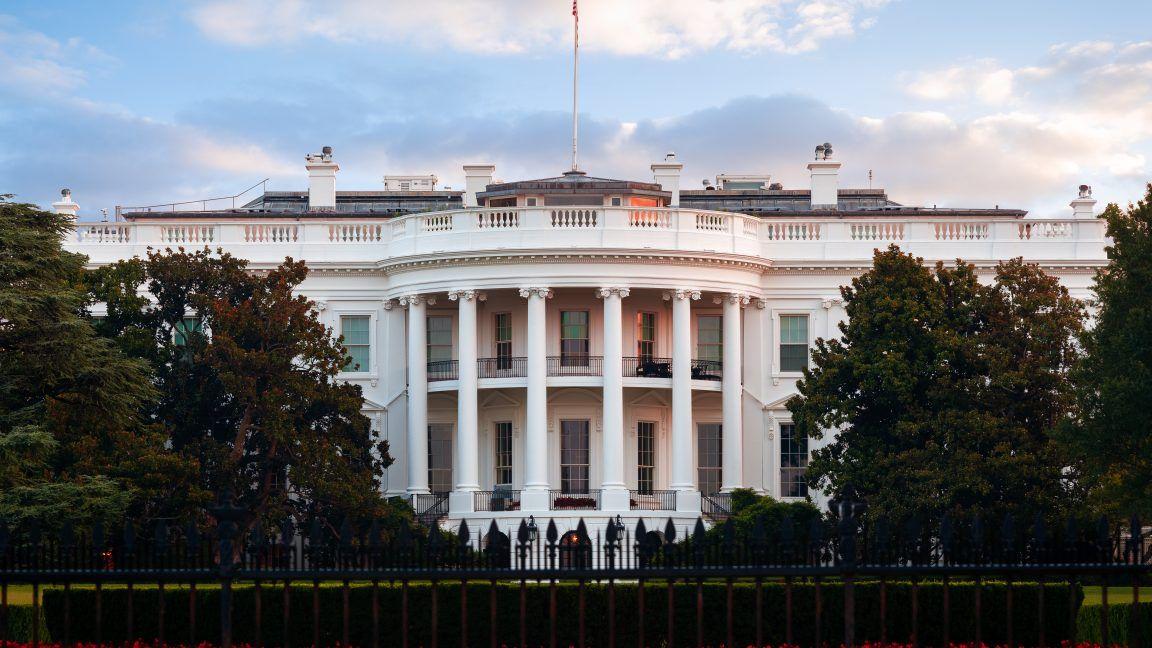Trump Orders $50M AI Boost for Childhood Cancer Research Amid Budget Controversies
8 Sources
8 Sources
[1]
Trump Order Directs Use of AI to Boost Childhood Cancer Research
President Donald Trump directed the federal government to use artificial intelligence to improve childhood cancer research and funneling $50 million to the National Institutes of Health for that initiative, even as his administration pursues other cuts at the agency. "For years we've been amassing data about childhood cancer, but until now, we've been unable to fully exploit this trove of information and apply it to practical medicine," Trump said in the Oval Office on Tuesday as he signed the directive. "Using cutting edge AI we will empower scientists and researchers to discover new treatments, cures and prevention strategies. AI can also make groundbreaking trials and therapies and just going to be so accessible to everybody."
[2]
Trump Executive Order Aims to Use AI to Boost Childhood Cancer Research
CHICAGO (Reuters) -U.S. President Donald Trump signed an executive order on Tuesday to bolster the use of artificial intelligence and provide an additional $50 million in research grants aimed at finding cures for childhood cancers, according to a White House official. The order builds on the National Cancer Institute's Childhood Cancer Data Initiative, a 10-year, $500 million program announced by Trump during his 2019 State of the Union Address focused on gathering and sharing data on childhood cancers. "Pediatric cancer remains the leading cause of chronic disease-related deaths for children in the United States, and its incidence has increased by more than 40% since 1975," Michael Kratsios, director of the White House Office of Science and Technology Policy, said in a briefing. Data gathered through the 2019 initiative now make it possible for researchers to use AI to "improve clinical trials, sharpen diagnoses, fine-tune treatment, unlock cures and strengthen prevention strategies," Kratsios said. The data initiative proposed $50 million in funding over 10 years. According to a White House official, the National Institutes of Health will be doubling its investment by an additional $50 million to take advantage of, and improve, existing data, with more investments planned. The funding is aimed at attracting scientific teams through competitive research grants, the official said. The announcement follows Trump's 2026 budget proposal for cutting the NCI budget by 37%, cuts that were ignored in both the House and Senate 2026 budget proposals, which have not yet been finalized. Advances in the use of artificial intelligence in pediatric cancers have lagged those in adult cancers, in part because of the diversity and rarity of pediatric cancers, and ethical issues tied to data protection for young patients, according to a 2024 editorial in The Lancet. According to the World Health Organization, some 400,000 children from infants to age 19 are diagnosed with cancer worldwide each year. (Reporting by Julie SteenhuysenEditing by Bill Berkrot)
[3]
Trump executive order aims to use AI to boost childhood cancer research
CHICAGO, Sept 30 (Reuters) - U.S. President Donald Trump signed an executive order on Tuesday to bolster the use of artificial intelligence and provide an additional $50 million in research grants aimed at finding cures for childhood cancers, according to a White House official. The order builds on the National Cancer Institute's Childhood Cancer Data Initiative, a 10-year, $500 million program announced by Trump during his 2019 State of the Union Address focused on gathering and sharing data on childhood cancers. "Pediatric cancer remains the leading cause of chronic disease-related deaths for children in the United States, and its incidence has increased by more than 40% since 1975," Michael Kratsios, director of the White House Office of Science and Technology Policy, said in a briefing. Data gathered through the 2019 initiative now make it possible for researchers to use AI to "improve clinical trials, sharpen diagnoses, fine-tune treatment, unlock cures and strengthen prevention strategies," Kratsios said. The data initiative proposed $50 million in funding over 10 years. According to a White House official, the National Institutes of Health will be doubling its investment by an additional $50 million to take advantage of, and improve, existing data, with more investments planned. The funding is aimed at attracting scientific teams through competitive research grants, the official said. The announcement follows Trump's 2026 budget proposal for cutting the NCI budget by 37%, cuts that were ignored in both the House and Senate 2026 budget proposals, which have not yet been finalized. Advances in the use of artificial intelligence in pediatric cancers have lagged those in adult cancers, in part because of the diversity and rarity of pediatric cancers, and ethical issues tied to data protection for young patients, according to a 2024 editorial in The Lancet. According to the World Health Organization, some 400,000 children from infants to age 19 are diagnosed with cancer worldwide each year. Reporting by Julie Steenhuysen Editing by Bill Berkrot Our Standards: The Thomson Reuters Trust Principles., opens new tab
[4]
Trump orders $50M for AI in pediatric cancer research
President Trump signed an order Tuesday directing his administration to invest $50 million in AI-driven pediatric cancer research. Why it matters: The move is part of a broader embrace of artificial intelligence across federal agencies but comes as the administration is slashing biomedical research spending and pausing grants. Driving the news: The order directs the presidentially appointed Make America Healthy Again Commission to work with the Office of Science and Technology Policy to harness data from a childhood cancer data initiative Trump established during his first term, OSTP Director Michael Kratsios said. * The data initiative's budget is being doubled by this investment. * "Leveraging this data infrastructure, researchers will deploy artificial intelligence to improve clinical trials, sharpen diagnoses, fine tune treatments, unlock cures and strengthen prevention strategies," Kratsios said. * For example, researchers will build scalable models to predict how a child's body responds to therapies, in order to forecast cancer progression and minimize treatment side effects. * AI could help guide researchers to treatments in the future that "will have a higher cure rate" and fewer side effects, said National Institutes of Health Director Jay Bhattacharya. Between the lines: A White House official said the effort builds on existing technology but declined to name any companies or specific software. * There will be a broad call for research proposals using AI to fight childhood cancer, officials said. The effort will also harness electronic health records and claims data to inform research and clinical trial design, they said. Reality check: The Trump administration proposed a roughly 40% cut to NIH's budget over the summer. While Congress has resisted such a move, cancer researchers have raised alarms about the damage funding freezes have had an institutions around the country.
[5]
Trump Orders NIH to Spend $50 Million on AI to Combat Childhood Cancer - Decrypt
The announcement comes as the administration faces criticism for deep cuts to broader cancer research funding, including a proposed $2.7 billion reduction to the National Cancer Institute budget. President Donald Trump signed an executive order Tuesday directing the National Institutes of Health to spend $50 million developing AI systems to analyze data related to childhood cancer, in a move the administration said could "fundamentally transform" how young cancer patients are treated in the United States. "The treatments of the future will have the promise of a higher cure rate as well as lower side effects," Jay Bhattacharya, director of the National Institutes of Health, told reporters Tuesday. "With this executive order, we have a real chance of making this promise real." A White House official told reporters Tuesday that, in the immediate term, the NIH will pay $50 million to scientific teams leveraging AI with the aim of improving childhood cancer-related clinical trials, sharpening diagnoses, fine-tuning treatments, discovering cures, and strengthening prevention strategies. "The promise of AI is to allow us to understand how rare cancers can be managed well," the official said. "The outcomes for patients with lung cancer, what lessons can they teach us for managing other cancers?" More investments will come over time as the NIH implements today's executive order, the official added. The White House intends for AI research teams to rely largely on data collected via the Childhood Cancer Data Initiative, which Trump established in 2019 during his first term in office. The NIH may also direct some funding announced today towards improving its data collection operations. It's not yet known which AI companies will receive these government contracts, and it's too early to say, according to the White House. The NIH will soon announce a call for research proposals on the subject, and an "open scientific competition" will see teams "evaluated by NIH processes on figures, peer review, [and] the most promising ideas," a White House official said. Under the second Trump administration, emerging technology companies have seen a boom in government contract work, even as the White House slashes research and spending across the board nationwide. Numerous crypto companies, for instance, were tapped last month to bring federal agencies on-chain -- making use of blockchain networks to store government data -- an initiative that continues to expand. Government spending cuts by the White House this year appear to have significantly impacted cancer research. In recent months, the Trump administration has already canceled hundreds of millions of dollars in cancer-related research grants and contracts; it has also pushed to reduce the federal government's financial obligations in supporting federally funded cancer research labs. The White House's proposed budget for 2026 would also cut $2.7 billion worth of funding from the NIH's cancer-focused wing, the National Cancer Institute -- a budget reduction of over 37%. When asked Tuesday how the childhood cancer AI initiative squares with the Trump administration's recent, steep cuts to cancer research in other areas, the White House official pushed back. "The president's policy is to invest fully in cancer research," they said, "so I guess I reject the premise of the question."
[6]
Trump signs executive order to use AI in fight against child cancer
The move doubles previous funding but comes against a backdrop of broader cuts to federal science budgets, including the loss of grants for long-running pediatric cancer research networks. President Donald Trump has announced a new executive order aimed at using artificial intelligence (AI) to increase progress in the fight against pediatric cancer. The order pledges $50 million(€43 million) in new funding to a childhood cancer data initiative, first launched during Trump's initial term in office. Officials say the funding will help gather and analyse vast amounts of medical data, to use AI to improve diagnoses, speed up clinical trials and sharpen prevention efforts. "We're going to hook up the artificial intelligence with all of the other things that we have at hand," Trump said in the Oval Office on Tuesday. "And we're going (to) come for answers and these young children who are just really, some are absolutely better and others are getting better". Turning to the young cancer survivors gathered around the Resolute desk, Trump added: "You're all going to be better very soon". White House officials declined to specify which companies or technologies might take part, saying the details are still in development. But Trump suggested the technology would eventually be widely available: "It's gonna be so accessible to everybody". Although relatively rare, cancer is the leading cause of disease-related death after infancy among children in the United States. The American Cancer Society estimates that about 9,550 children in the US will be diagnosed with cancer in 2025. While survival rates have improved dramatically - with childhood cancer mortality falling by more than 50 per cent since 1975 - incidence rates have steadily increased since the 1970s. Globally, cancer affects around 400,000 children and adolescents under 19 each year, according to the World Health Organization (WHO). Pediatric cancer research also remains chronically underfunded, representing less than 10 per cent of the federal cancer research budget, according to the Children's Cancer Foundation. Trump's executive order doubles the National Institutes of Health's commitment to the Childhood Cancer Data Initiative, bringing total funding to $100 million. But it comes against a backdrop of broader cuts to federal science funding under his administration. In recent years, hundreds of scientists have been removed from the federal payroll and several hundred million dollars in grants - including some supporting pediatric cancer studies - have been cancelled. The Pediatric Brain Tumor Consortium, a national network that has given children access to experimental treatments for more than 25 years, was told in August it would no longer receive federal support. Earlier budget drafts also proposed slashing the National Cancer Institute's funding by more than a third, but those cuts still remain under negotiation. The American Cancer Society Cancer Action Network has warned that the proposed cuts "will set this nation back dramatically in our ability to reduce death and suffering".
[7]
Trump Executive Order Aims to Use AI to Boost Childhood Cancer Research
CHICAGO (Reuters) -U.S. President Donald Trump signed an executive order on Tuesday to bolster the use of artificial intelligence and provide an additional $50 million in research grants aimed at finding cures for childhood cancers, according to a White House official. The order builds on the National Cancer Institute's Childhood Cancer Data Initiative, a 10-year, $500 million program announced by Trump during his 2019 State of the Union Address focused on gathering and sharing data on childhood cancers. "Pediatric cancer remains the leading cause of chronic disease-related deaths for children in the United States, and its incidence has increased by more than 40% since 1975," Michael Kratsios, director of the White House Office of Science and Technology Policy, said in a briefing. Data gathered through the 2019 initiative now make it possible for researchers to use AI to "improve clinical trials, sharpen diagnoses, fine-tune treatment, unlock cures and strengthen prevention strategies," Kratsios said. The data initiative proposed $50 million in funding over 10 years. According to a White House official, the National Institutes of Health will be doubling its investment by an additional $50 million to take advantage of, and improve, existing data, with more investments planned. The funding is aimed at attracting scientific teams through competitive research grants, the official said. The announcement follows Trump's 2026 budget proposal for cutting the NCI budget by 37%, cuts that were ignored in both the House and Senate 2026 budget proposals, which have not yet been finalized. Advances in the use of artificial intelligence in pediatric cancers have lagged those in adult cancers, in part because of the diversity and rarity of pediatric cancers, and ethical issues tied to data protection for young patients, according to a 2024 editorial in The Lancet. According to the World Health Organization, some 400,000 children from infants to age 19 are diagnosed with cancer worldwide each year. (Reporting by Julie SteenhuysenEditing by Bill Berkrot)
[8]
Trump signs order aimed at using artificial intelligence to boost childhood cancer treatment
President Trump signed an executive order on Tuesday aimed at using artificial intelligence to improve research and treatments for childhood cancer. The order builds on a 2019 database established by Trump that collects data on childhood cancer. That order directs agencies to use artificial intelligence to analyze information in that database to accelerate research and clinical trials. "Using cutting-edge AI, we will empower scientists and researchers to discover new treatments, cures and prevention strategies," Trump said in the Oval Office. "AI can also make groundbreaking trials and therapies - it's just going to be so accessible to everybody." The order coincides with an announcement from the Department of Health and Human Services (HHS) that the agency is doubling the funding for the Childhood Cancer Data Initiative that Trump established in 2019. The agency said parents will still control their child's health information, even as the information in the database will be analyzed by artificial intelligence to advance research. "This is not about collecting data alone. It's about giving families hope," Jay Bhattacharya, director of the National Institutes of Health, said during Trump's executive order signing. "With this executive order that President Trump is signing, we're building a future where every child's data contributes to faster diagnosis," Bhattacharya said, adding that AI would help researchers uncover "faster, more precise treatments" and improve quality of life. Trump was joined in the Oval Office by multiple childhood cancer survivors and their family members, who spoke about the value of Tuesday's order. Josh Armstrong, from West Virginia, spoke about how his 6-year-old daughter was diagnosed with cancer when she was 2. "We'd like to say that what you're doing today gives parents like me and children like Laurel the one thing we mostly desperately need. And that's hope," Armstrong said. "And I'm happy to say Laurel is in remission today."
Share
Share
Copy Link
President Trump signs an executive order allocating $50 million for AI-driven pediatric cancer research, building on previous initiatives. The move comes amid criticism over proposed budget cuts to broader cancer research funding.
Trump's Executive Order on AI for Childhood Cancer Research
President Donald Trump has signed an executive order directing the use of artificial intelligence (AI) to boost childhood cancer research, allocating an additional $50 million to the National Institutes of Health (NIH) for this initiative
1
2
. The order builds upon the National Cancer Institute's Childhood Cancer Data Initiative, a 10-year, $500 million program announced by Trump in 20193
.
Source: Euronews
Leveraging AI for Pediatric Cancer Research
The initiative aims to harness the power of AI to analyze vast amounts of data collected through the Childhood Cancer Data Initiative. Michael Kratsios, director of the White House Office of Science and Technology Policy, stated that AI will be used to "improve clinical trials, sharpen diagnoses, fine-tune treatment, unlock cures and strengthen prevention strategies"
2
.NIH Director Jay Bhattacharya emphasized the potential of AI to guide researchers towards treatments with higher cure rates and fewer side effects
4
. The White House plans to issue a broad call for research proposals, fostering an "open scientific competition" to attract the most promising ideas in AI-driven pediatric cancer research5
.
Source: Bloomberg
Challenges and Controversies
Despite the positive intent of this initiative, it faces several challenges:
-
Lagging AI advancements in pediatric cancers compared to adult cancers, due to the diversity and rarity of childhood cancers and ethical issues related to data protection for young patients
2
. -
The announcement comes amid criticism of the Trump administration's proposed budget cuts to broader cancer research funding. The 2026 budget proposal includes a 37% cut to the National Cancer Institute's budget, amounting to $2.7 billion
5
. -
Recent cancellations of hundreds of millions of dollars in cancer-related research grants and contracts, as well as reduced support for federally funded cancer research labs
5
.
Related Stories
Global Context and Future Implications
According to the World Health Organization, approximately 400,000 children from infants to age 19 are diagnosed with cancer worldwide each year
3
. The success of this AI-driven initiative could potentially have far-reaching implications for pediatric cancer treatment globally.
Source: Reuters
As the initiative unfolds, it will be crucial to monitor its progress and impact, especially in light of the broader context of cancer research funding and the evolving role of AI in healthcare.
References
Summarized by
Navi
Related Stories
Trump's Executive Order Aims to Boost AI Education in K-12 Schools Amid Global Competition
23 Apr 2025•Policy and Regulation

Trump Overturns Biden's AI Safeguards, Calls for 'Ideologically Unbiased' Development
21 Jan 2025•Policy and Regulation

HHS unveils AI strategy to expand adoption across healthcare divisions amid data privacy concerns
05 Dec 2025•Policy and Regulation

Recent Highlights
1
ByteDance's Seedance 2.0 AI video generator triggers copyright infringement battle with Hollywood
Policy and Regulation

2
Demis Hassabis predicts AGI in 5-8 years, sees new golden era transforming medicine and science
Technology

3
Nvidia and Meta forge massive chip deal as computing power demands reshape AI infrastructure
Technology





